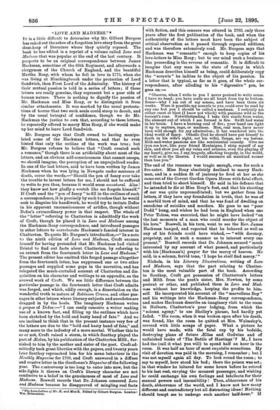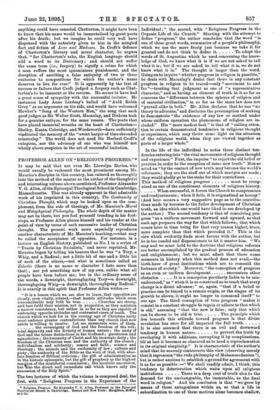"LOVE AND MADNESS."* IT is a little difficult to determine
why Mr. Gilbert Burgess has raked out the ashes of a forgotten love-story from the great dust-heap of literature where they quietly reposed. The book he has edited is a reprint of a volume called Love and Madness that was popular at the end of the last century. It purports to be an original correspondence between James Hackman, sometime of the 68th Regiment, and afterwards a clergyman of the Church of England, and the beautiful Martha Reay, with whom he fell in love in 1775, when she was living at Hinchingbrook under the protection of Lord Sandwich, then First Lord of the Admiralty. The history of their mutual passion is told in a series of letters ; if these letters are really genuine, they represent but a poor side of human nature. There is nothing to dignify the passion of Mr. Hackman and Miss Reay, or to distinguish it from similar attachments. It was marked by the usual protesta- tions of horror that two such souls could stoop to deceit, and by the usual betrayal of confidence, though we do Mr. Hackman the justice to own that, according to these letters, he repeatedly offered to marry Miss Reay, if she would make up her mind to leave Lord Sandwich.
Mr. Burgess says that Croft owned to having manipu- lated some of the Hackman letters, and that he even hinted that only the outline of the work was true ; but Mr. Burgess refuses to believe that "Croft created such a romance," though there is an artificiality about most of the letters, and an obvious self-consciousness that cannot escape, we should imagine, the perception of an unprejudiced reader.
in one of the last letters, said to have been written by James Hackman when he was lying in Newgate under sentence of death, occur the words,—" Should the pen of fancy ever take the trouble to invent letters for me, I should not be suffered to write to you thus, because it would seem unnatural. Alas !
they know not how gladly a wretch like me forgets himself."
if Croft used the " pen of fancy " to fill in the outlines of such a correspondence, it is precisely by such touches that he would
seek to disguise his handiwork, he would try to imitate Defoe in his apparent unconsciousness of artifice, though without Defoe's extraordinary power in that respect. The whole of the "letter" referring to Chatterton is admittedly the work of Croft, though he placed it in Love and Madness among the Hackman-Reay correspondence, and introduced passages in other letters to corroborate Hackman's fancied interest in Chatterton. To quote Mr. Burgess's introduction,—" In a note to the ninth edition of Love and Madness, Croft excuses himself for having pretended that Mr. Hackman had visited Bristol to find out facts about Chatterton, by referring to an extract from the fourteenth letter in Love and Madness." The present editor has omitted this forged passage altogether from the fourteenth letter, has suppressed one or two other passages and supplied some gaps in the narrative, and has relegated the much-curtailed account of Chatterton and dis- quisition on his character and writings to an appendix, as the avowed work of Croft. We see little difference between the particular passage in the fourteenth letter that Croft admits was forged, and which, oddly enough, is a dissertation on the wonderful truth to nature of Robinson Crusoe, and other pas- sages in other letters where literary subjects and anecdotes are dragged in by the heels. The imaginary Hackman writes
with fiction, and this censure was uttered in 1783, only three years after the first publication of the book, and when the authenticity of the letters must have been the subject of critical observation as it passed through repeated editions, and was therefore extensively read. Mr. Burgess says that Hackman was " romantic " enough to keep copies of his love-letters to Miss Reay ; but to our mind such a business- like proceeding is the reverse of romantic. It is difficult to imagine that any man in the state of frenzy in which Hackman describes himself as being, could deliberately copy the " scrawls " he indites to the object of his passion. In a letter that is typical, as far as it goes, of the whole cor-
respondence, after alluding to his " digressive " pen, he goes on:— "Observe, when I write to you I never pretend to write sense. I have no head; you have made me all heart from top to bottom. Sense—why I am out of my senses, and have been these six weeks. Were it possible my scrawls to you could ever be read by any one but you I should be called a madman. I certainly am either curst or blest (I know not which) with passions wild as the torrent's roar. Notwithstanding I take this simile from water, the element out of which I am formed is fire. Swift had water in his brain. I have a burning coal of fire; your hand can light it up to rapture, rage, or madness. Men, real men, have never been wild enough for Any admiration; it has wandered into the ideal world of fancy. Othello (but he should have put himself to death in his wife's sight, not his wife), Zanga, are my heroes. Milk-and-water passions are like sentimental comedy. Give me (you see how, like your friend Montaigne, I strip myself of my skin, and show you all my veins and arteries, even the playing of my heart), give me, I say, tragedy, affecting tragedy, in the world, as well as in the theatre. I would massacre all mankind sooner than lose you."
The end of the romance was tragic enough, even for such a fire-eater. Miss Reay absolutely declined to marry Hack- man, and in a sudden fit of jealousy he fired at her as she came out of the Covent Garden Opera House with fatal effect, and then tried to shoot himself. He said in his defence that he intended to die at Miss Reay's feet, and that his shooting of ner was quite unpremeditated; but we gather from his letters, if they have any foundation in truth, that he was of a morbid turn of mind, and that he was fond of dwelling on anecdotes of suicides and murders. He goes to see " poor Dodd " hung, and wishes he had been in England when one Peter Tolosa, was executed, that he might have looked "on the last moments of a man who could murder the object of his love." Boswell, in his turn, went to see the Rev. James Hackman hanged, and reported that he behaved as well as any of his friends could have wished, — "with decency, propriety, and in such a manner as to interest every one present." Boswell records that Dr. Johnson seemed " much interested by my account of what passed, and particularly with his [Hackman's] prayer for the mercy of heaven. He said, in a solemn, fervid tone, I hope he shall find mercy!" Nichols, in his Literary Illustrations, writing of Love and Madness, says that the part relating to Chatter- ton is the most valuable part of the book. According to Southey, Croft got possession of Chatterton's letters and MSS. from the poet's sister, Mrs. Newton, by some pretext or other, and published them in Love and Mad- ness without her knowledge, keeping the profits to him- self. He incorporated his account of the "marvellous Boy" and his writings into the Hackman Reay correspondence, and makes Hackman describe an imaginary visit to the room in Holborn, Chatterton's poor lodging, from which the " solemn agony," to use Shelley's phrase, had hardly yet faded. "His room, when it was broken open after his death, was found, like the room he quitted at Mrs. Walmsley's, covered with little scraps of paper. What a picture he would have made, with the fatal cup by his bedside, destroying plans of future ..11as and Godwins and of unfinished books of 'The Battle of Hastings 'P M., I have had the (call it what you will) to spend half an hour in the room. It was half an hour of most exquisite sensations. My visit of devotion was paid in the morning, I remember ; bat I was not myself again all day. To look round the room ; to say to myself, here stood his bed ; there the poison was set ; in that window he loitered for some hours before he retired to his last rest, envying the meanest passenger, and wishing he could exchange his own feelings and intellects for their manual powers and insensibility ! Then, abhorrence of his death, abhorrence of the world, and I know not how many different and contradictory but all distracting ideas! Nothing should tempt me to undergo such another half-hour." If anything could have consoled Chatterton, it might have been to know that his name would be immortalised by great poets after his death; bat we imagine he could very well have dispensed with the notoriety given to him in the mingled fact and fiction of Love and Madness. In Croft's defence of Chatterton's literary and moral character, he argues that, " for Chatterton's sake, the English language should add a word to its Dictionary ; and should not suffer the same term [i.e., forgery] to signify a crime for which a man suffers the most ignominious punishment, and the deception of ascribing a false antiquity of two or three centuries to compositions for which the author's name deserves to live for ever." It is apparently by the test of success or failure that Croft judged a forgery such as Chat. terton's to be innocent or the reverse. He seems to have had a great sense of sympathy with the successful imitator. He instances Lady Anne Lindsay's ballad of "Auld Robin Gray" as an argument on his side, and would have welcomed Hawker's "Song of the Western Men," the song that such good judges as Sir Walter Scott, Macaulay, and Dickens took for a genuine antique, for the same reason. The poets that have placed immortal wreaths on the tomb of Chatterton- Shelley, Keats, Coleridge, and Wordsworth—have sufficiently vindicated the memory of the "sweet harper of time-shrouded minstrelsy." The world does not need Sir Herbert Croft's eulogium, nor the advocacy of one who was himself not wholly above suspicion in the art of successful imitation.



































 Previous page
Previous page